 As the final votes are counted, pundits and pollsters sit stunned as Donald J. Trump gets set to enter the White House. For anyone in Britain, there is a sharp tang of déjà vu in the air: this feels like the morning after the Brexit vote all over again. Eric Kaufmann explains that, as with Brexit, there’s little evidence that the vote had much to do with personal economic circumstances.
As the final votes are counted, pundits and pollsters sit stunned as Donald J. Trump gets set to enter the White House. For anyone in Britain, there is a sharp tang of déjà vu in the air: this feels like the morning after the Brexit vote all over again. Eric Kaufmann explains that, as with Brexit, there’s little evidence that the vote had much to do with personal economic circumstances.
For months, commentators have flocked to diagnose the ills that have supposedly propelled Trump’s support, from the Republican primaries until now. As in Britain, many have settled on a ‘left behind’ narrative – that it is the poor white working-class losers from globalization that have put Trump over the top. Only a few clairvoyants – Michael Lind, Jonathan Haidt – have seen through the stereotypes.
But, as in Britain, there’s precious little evidence this vote had much to do with personal economic circumstances. Let’s look at Trump voting among white Americans from a Birkbeck College/Policy Exchange/YouGov survey I commissioned in late August. Look at the horizontal axis running along the bottom of figure 1. In the graph I have controlled for age, education and gender, with errors clustered on states. The average white American support for Trump on a 0-10 scale in the survey is 4.29.
You can see the two Trump support lines are higher among those at the highest end of the income scale (4) than the lowest (1). This is not, however, statistically significant. What is significant is the gap between the red and blue lines. A full two points in Trump support around a mean of 4.29. This huge spread reflects the difference between two groups of people giving different answers to a highly innocuous question: ‘Is it more important for a child to be considerate or well-mannered?’ The answers sound almost identical, but social psychologists know that ‘considerate’ taps other-directed emotions while ‘well-mannered’ is about respect for authority.
People’s answer to this question matters for Trump support because it taps into a cultural worldview sometimes known as Right-Wing Authoritarianism (RWA). Rather than RWA, which is a loaded term, I would prefer to characterise this as the difference between those who prefer order and those who seek novelty. Social psychologist Karen Stenner presciently wrote that diversity and difference tends to alarm right-wing authoritarians, who seek order and stability. This, and not class, is what cuts the electoral pie in many western countries these days. Income and material circumstances, as a recent review of research on immigration attitudes suggests, is not especially important for understanding right-wing populism.
Figure 1.
Now look at the same graph in figure 2 with exactly the same questions and controls, fielded on the same day, in Britain. The only difference is that we are substituting people’s reported Brexit vote for Trump support. This time the income slope runs the other way, with poorer White British respondents more likely to be Brexiteers than the wealthy. But income is, once again, not statistically significant. What counts is the same chasm between people who answered that it was important for children to be well-mannered or considerate. In the case of Brexit vote among White Britons, this represents a 25-point difference around a mean of 45.8 per cent (the survey undersamples Brexiteers but this does not affect this kind of analysis). When it comes to Brexit or Trump, think successful plumber, not starving artist or temporary lecturer.
Figure 2.
Some might say that even though these populist voters aren’t poor, they really, actually, surely, naturally, are concerned about their economic welfare. Well, let’s take a look at the top concerns of Trump voters in figure 3. I’ve plotted the issues where there are the biggest differences between Trump supporters and detractors on the left-hand side. We can start with inequality. Is this REALLY the driving force behind the Trump vote – all that talk about unemployment, opioid addiction and suicide? Hardly. Nearly 40 per cent of those who gave Trump 0 out of 10 (blue bar) said inequality was the #1 issue facing America. Among folks rating the Donald 10 out of 10, only 4 per cent agreed. That’s a tenfold difference. Now look at immigration: top issue for 25 per cent of white Trump backers but hardly even registering among Trump detractors. Compared to immigration, even the gap between those concerned about terrorism, around 2:1, is not very striking.
Figure 3.
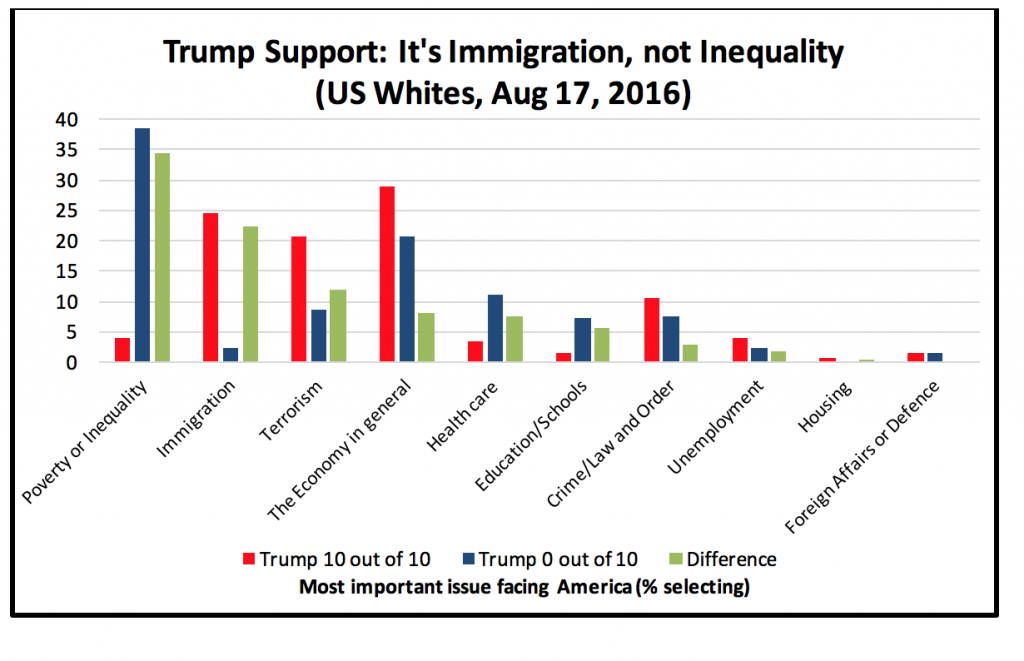 For Brexit vote, shown in figure 4, the story is much the same, with a few wrinkles. The gap on immigration and inequality is enormous. The one difference is on ‘the economy in general,’ which Trump supporters worry about more than Brexiteers. This could be because in the graph above I am comparing extreme Trump backers with extreme detractors whereas the Brexit-Bremain numbers include all voters. Still, what jumps out is how much more important immigration is for populist voters than inequality.
For Brexit vote, shown in figure 4, the story is much the same, with a few wrinkles. The gap on immigration and inequality is enormous. The one difference is on ‘the economy in general,’ which Trump supporters worry about more than Brexiteers. This could be because in the graph above I am comparing extreme Trump backers with extreme detractors whereas the Brexit-Bremain numbers include all voters. Still, what jumps out is how much more important immigration is for populist voters than inequality.
Figure 4.
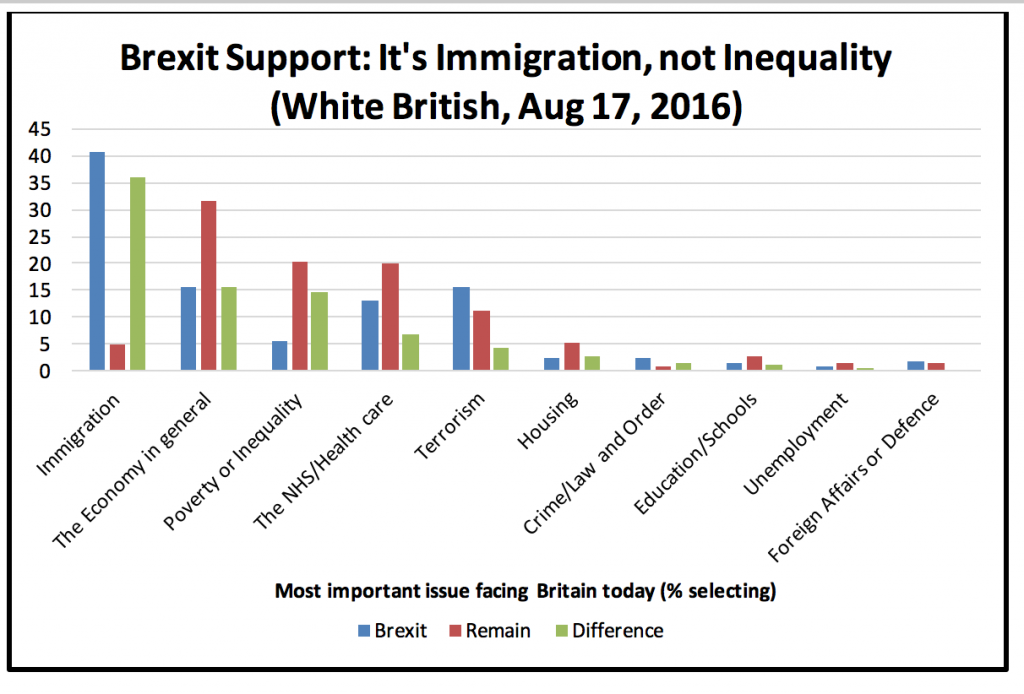 Why is Trump, Brexit, Höfer, Le Pen and Wilders happening now? Immigration and ethnic change. This is unsettling that portion of the white electorate that prefers cultural order over change.
Why is Trump, Brexit, Höfer, Le Pen and Wilders happening now? Immigration and ethnic change. This is unsettling that portion of the white electorate that prefers cultural order over change.
The US was about 90 percent white in 1960, is 63 percent white today and over half of American babies are now from ethnic minorities. Most white Americans already think they are in the minority, and many are beginning to vote in a more ethnopolitical way. The last time the share of foreign born in America reached current levels, immigration restrictionist sentiment was off the charts and the Ku Klux Klan had 6 million members – mainly in northern states concerned about Catholic immigration.
Ethnic change can happen nationally or locally, and it matters in both Britain and America. Figure 5, which includes a series of demographic and area controls, looks at the rate of Latino increase in a white American survey respondent’s ZIP code (average population around 30,000 in this data). The share of white Americans rating Trump 10 out of 10 rises from just over 25 percent in locales with no ethnic change to almost 70 percent in places with a 30-point increase in Latino population.
The town of Arcadia in Wisconsin – fittingly a state that has flipped to Trump – profiled in a recent Wall Street Journal article, shows what can happen. Thomas Vicino has chronicled the phenomenon in other towns, such as Farmer’s Branch, Texas or Carpentersville, Illinois. There are very few ZIP codes that have seen change on this scale, hence the small sample and wide error bars toward the right. Still, this confirms what virtually all the academic research shows: rapid ethnic change leads to an increase in anti-immigration sentiment and populism, even if this subsequently fades. The news also spreads and can shape the wider climate of public opinion, even in places untouched by immigration.
Figure 5.
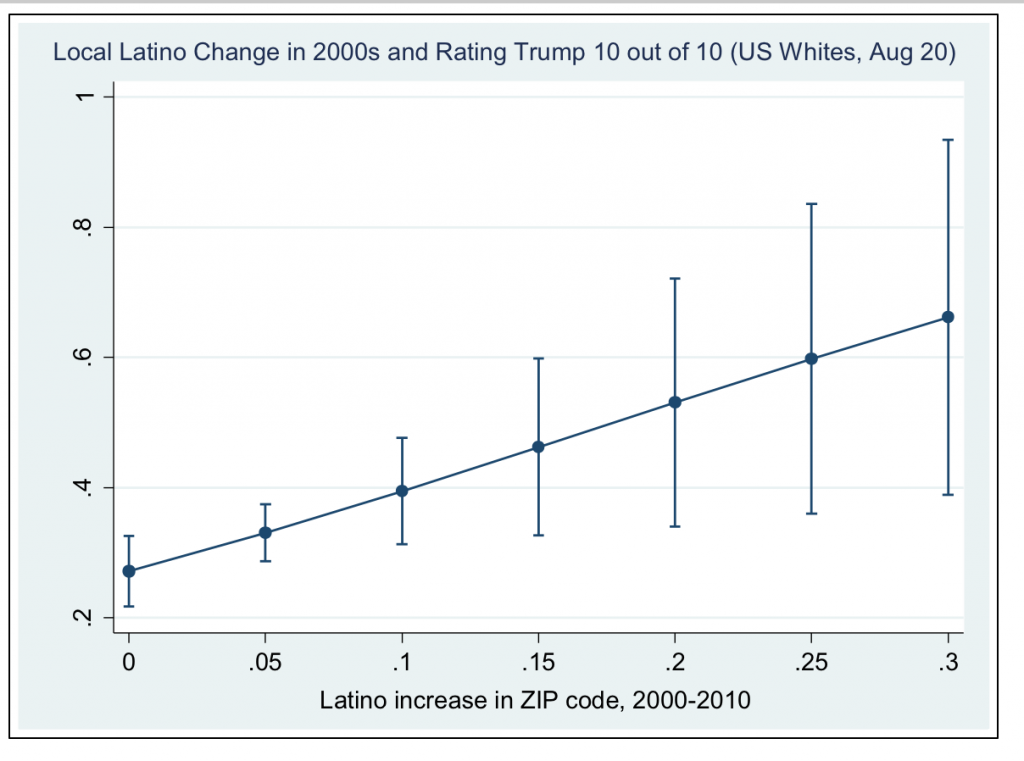 Now let’s look in figure 6 at Brexit, and how White British voters in wards with fast East European growth in the 2000s voted. With similar controls, it’s the same story: when we control for the level of minorities in a ward, local ethnic change is linked with a much higher rate of Brexit voting. From under 40 percent in places with no ethnic change to over 60 percent voting Brexit in the fastest changing areas. Think Boston in Lincolnshire, which had the strongest Brexit vote in the country and where the share of East Europeans jumped from essentially zero in 2001 to the highest in the country by 2011.
Now let’s look in figure 6 at Brexit, and how White British voters in wards with fast East European growth in the 2000s voted. With similar controls, it’s the same story: when we control for the level of minorities in a ward, local ethnic change is linked with a much higher rate of Brexit voting. From under 40 percent in places with no ethnic change to over 60 percent voting Brexit in the fastest changing areas. Think Boston in Lincolnshire, which had the strongest Brexit vote in the country and where the share of East Europeans jumped from essentially zero in 2001 to the highest in the country by 2011.
Figure 6.
The Trump and Brexit votes are the opening shots which define a new political era in which the values divide between voters – especially among whites – is the main axis of politics. In a period of rapid ethnic change, this cleavage separates those who prefer cultural continuity and order from novelty-seekers open to diversity. Policymakers and pundits should face this instead of imagining that old remedies – schools, hospitals, jobs – will put the populist genie back in the bottle.
____
 Eric Kaufmann is Professor of Politics at Birkbeck College, University of London. He is author of The Rise and Fall of Anglo-America: the decline of dominant ethnicity in the United States. His latest publication is a Demos report, freely available, entitled Changing Places: the White British response to ethnic change.
Eric Kaufmann is Professor of Politics at Birkbeck College, University of London. He is author of The Rise and Fall of Anglo-America: the decline of dominant ethnicity in the United States. His latest publication is a Demos report, freely available, entitled Changing Places: the White British response to ethnic change.


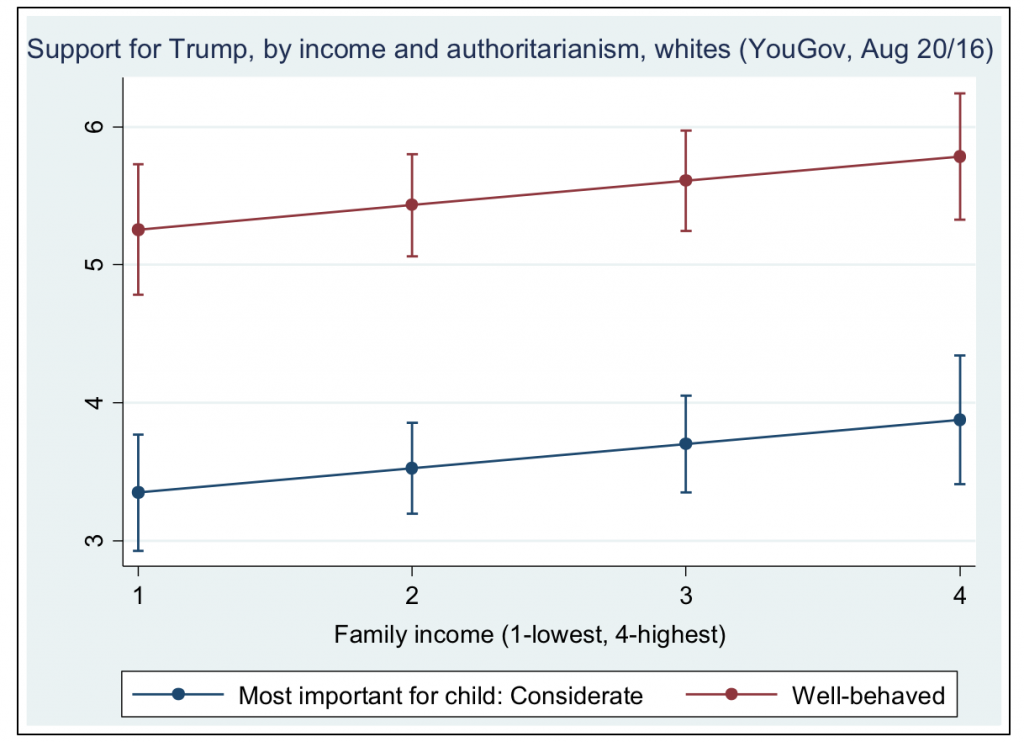
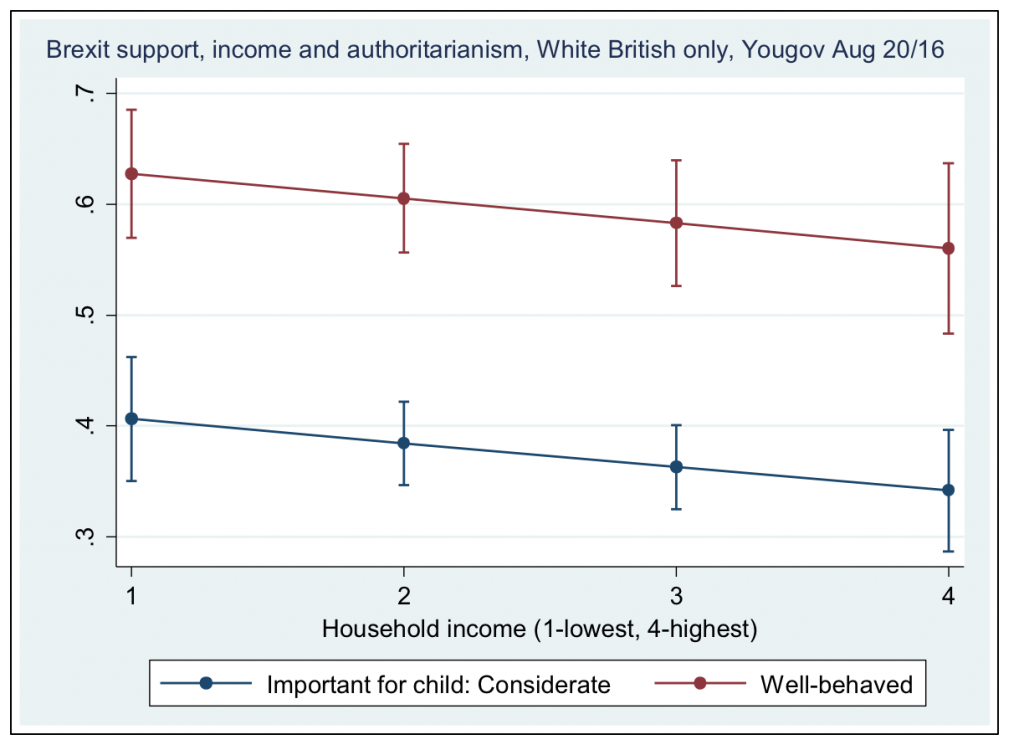
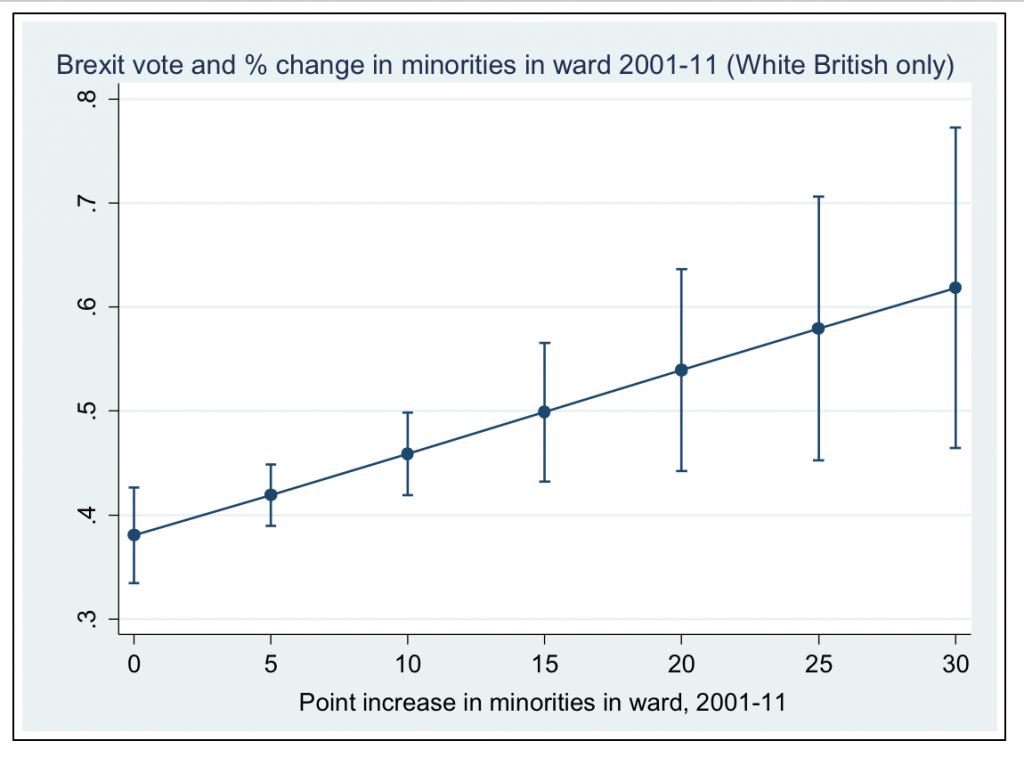






This data isn’t very convincing that the widening inequality and stagnating wages isn’t substantially associated with the rise of a more polarised political spectrum that demonstrates authoritarianism and anti-immigrant sentiment on the right.
Firstly, the attitudinal data is cross sectional and doesn’t show how attitudes have changed over time in relation to each other. It doesn’t show if anti-immigration attitudes have perhaps decreased and economic concerns have recently increased, it just shows their ranking now. Also, as to the construct validity of assuming that anti-immigration attitudes are influenced by economic inequality, such as wage stagnation, in short, the possibility that other economic insecurity converts other anxieties into fear of immigrants isn’ considered. Mainly because its not possible with this type of data, if a time-series were used, the relationships could be observed over time and other variables could be controlled for.
This is a very limited analysis that does not allow us to draw any clear conclusions about the factors underlying anti immigration attitudes.
Face this and you will have a civil war on your hands. The values of both sides are not something they want aired to the elites right now.
Why? Because both sides know what the other is doing already, both sides are desperate and unwilling to change (at present) and both sides, particularly white people at present, as the money hasn’t ran out yet, want to keep up the pretence that the political “establishment” doesn’t know their race politics is as nasty as it truly is (which it does and merely pretends not to) because they know only too well the elite will worsen the situation by any attempt to correct them from thinking the way they want to and further undermining an already fragile social demographic.
The whites, they already know the world economy is finished and ran on ponzi money by corrupt bankers to no tangibile end for most; they see an overpopulated world lead by dictators that will spread racial prejudice when the bust comes and they know they will be the world’s scapegoat for the mess. They prefer honesty to novelty. The poor immigrants have nothing to lose anyway, they have no assets to begin with and already know they must stop the whites and democracy from raising these questions and plunging the world into a spooked depression in which they’ll be dirt poor.
People in power in the West have not the tools to correct this problem at present and won’t anytime soon. They also aren’t fully aware of just how clever most voters are, especially after the little “enlightenment” they all had 10 years ago about just how all this shit works. No, most people haven’t forgotten and yes, most people have pieced it all together in the minds like it or not.
Guess what? It’s the economy stupid, well sort of!
There is an ever growing gap between the modern politician and the lower echelons of society and this is responsible for the Trump factor IMHO.
Very high quality comments here. A few things I would say. First, there is an important difference between support for Trump and voting for Trump. Alongside support for Trump, party identity and propensity to turnout count in actual voting. So many who dislike Trump may well have voted Republican or not turned out. However, the key point is that response to Trump is largely conditioned by the same cultural factors that drove the Brexit vote. Second, while any who back Trump say the economy in general is their most important issue, this is also true for those who dislike Trump. In the US context, the media and politics has tended to revolve around the economy so many cite it as ‘the most important challenge facing America’. But in terms of explaining the DIFFERENCE between Trump supporters and detractors, it is not significant. We should also bear in mind that in answer to the 5-option question, ‘should immigration be reduced, increased or stay the same’, Trump supporters overwhelmingly (80%) say ‘reduced a lot’. For Brexit voters, the equivalent figure is 70%. Finally, remember that this is academic journalism, not an academic paper! My aim is to write this all up as an article soon – stay tuned!
“while any who back Trump say the economy in general is their most important issue, this is also true for those who dislike Trump.”
I might be missing something, but to me this statement has little meaning in the context of this analysis. In fact, it maybe a true statement for nearly all elections in history.
When we say that the economy matters, we mean that a) the current administration must have left a significant amount of voters unsatisfied, and b) that the winning candidate has been more effective than his opponent in convincing voters that his policies will improve the economy. Or at least the pockets of the voters concerned.
It is also obvious – but worth restating – that the perception of where the economy is, and of where it can go, are personal and widely varying.
I don’t think that asking ourselves to which extent did the economy matter for voters of each candidate can bring us anywhere. We should instead ask ourselves “what is the distribution of the voters who said the economy is the key issue? who did they tend to vote for?”. And the same goes for all other issues we identify, providing we also analyse what link each of them has with the perception of the state of the economy (e.g. immigration issues are generally linked to the issue of the economy).
Forgot to add: my suggestion above on how to analyse the impact of each issue should be carried out state by state, and not on the aggregate of US voters, given the system in place (in fact, Clinton won the popular vote, therefore doing it on the aggregate would be pretty meaningless).
So the question is: “What is the distribution of voters between candidates on each key issue, state by state?”
The answer will tell us why Clinton has lost certain states it was supposed to win. Finding out whether the economy mattered in those states will give us the ultimate answer to the overarching question.
Indeed, 2016 will be a year students in USA and Europe will talk a lot about and will learn many lessons from, probably in very near future. In 2016 we have just witnessed how history, a major part of the modern history is made with the global political reorganization. It is a very interesting phenomenon that despite the fact that in a global sense people are seeking more stability and ethnical saturation of their own nationality that leads to less diversity, all these people are willing to initiate such major and dramatic changes in global politics. Thank you for the interesting analysis!
But if the Trump voters were all about wanting authority to subdue disorder, why did a concern for crime/disorder score so low with them?
Prof,
I have a couple of questions regarding your two papers
Explaining the Brexit vote by personality trait is interesting, but I don’t immediately see how this squares with the markedly uneven geographical distribution observed in the referendum result. As you say in para 5 of your first paper, ‘vary within, not across, districts’.
As to Fig 6 in your second paper, it would be useful to know the weighting that should be given to each point on the line. What would also be nice is a map showing the distribution of ‘point increase in minorities’, just to check if it mirrors the referendum result.
Professor Kaufmann,
The inference that can be made from this article is severely limited by the lack of two items:
(1) The distribution of pro Trump voters by rating
(2) A lack of analysis of the preferences of the group of pro-Trump voters with the mode rating of Mr. Trump. It is a much more interesting analysis to look at the Trump voters who were more limited in their personal liking of the candidate and who undoubtedly form a larger proportion of pro-Trump voters than those who consider him a perfect candidate.
I thank Prof. Eric Kaufmann for this report of a study rather well conducted. I was informed by the content to the extent that I would selectively and guardedly value its findings. However,I am of the opinion that if the report were more like a “research study report” with all that it is supposed to contain as we teach it to our students, it would be better serving to and for its readers. This would probably erase some of the questions raised by the other commentators. Therefore, I think more like, and agree with, TIM (Nov. 10, 2016), and Michelle (Nov.11, 2016) and other previous commentators, whose interest in the content of the article would even be more as an academic and yet concerned reader. In essence, I expect to see more “practice and/or research problem(s) and question(s), variables, theoretical and operational definitions of variables, methodology (methods and procedures), findings, conclusions, implications and recommendations” kinds of subheadings in reports of a research study such as this one, especially when these studies are conducted and reported by the academics and academic institutions like LSE, and despite the fact that they are reported on social media. Thank you.
Starting to get there, but for UK & BREXIT I think better to use the words “cultual change” and immigration rather than ethnic change. On the assumption that we are not classifying the migration from other EU countries as ethnic change… (It could be, but largely wasn’t).
Very interesting, but I think the headline this gets in the New Statesman- ‘how Donald Trump won’ overstates the argument in a potentially dangerous way.
I’m sure it’s correct that this is a real phenomenon (although the bit about authoritarianism seems to simply be saying ‘right wingers vote right wing’). But people should remember that Trump currently actually has fewer votes than Clinton, and 43% of eligible voters didn’t vote. So what the above article suggests could be 100% true- but actually only apply to about a quarter of the US population. It’s not really an insurmountable ethnonationalist, populist landslide that explains his victory- a more popular Democratic candidate could fairly easily have beaten Trump.
That also means that the economy could well be an important factor- in encouraging people not to vote for Clinton, if not to vote for Trump.
But even then… it seems odd that an article titled ‘it’s NOT the economy’ shows us that, among the most extreme Trump supporters, ‘the general economy’ is actually the number one concern. You seem to bury this by talking about ‘equality’, but the figures suggest they’re actually more concerned about the economy than about immigration- and I’d expect that to be even more true of less extreme supporters (have you got figures on that?).
…….actually, sorry, I see the value of the ‘authoritarian’ bit now- ideology trumps (hah!) bank balance.
Personally I would criticize your analyzing only “0 out of 10” and “10 out of 10” for Trump, since every election for quite a long time is essentially decided by a few million swing voters. This is especially important in an election where both candidates had huge negatives (unprecedented really), but people still had to make a choice at the margin. Nobody is denying that hardcore Trump supporters are up in arms about immigration, and that hardcore Trump detractors tend to be highly multicultural or “pro-integration.” For those voters, party shifts are practically impossible or once-in-a-lifetime occurrences. If you looked at people in the 4-6 range, you would get more insight. I’m hoping you didn’t ignore such an analysis because it didn’t support your conclusion.
“Nobody is denying that hardcore Trump supporters are up in arms about immigration”
Given that, it’s also interesting that these results actually appear to show that the hardcore supporters are actually more concerned about the economy…
I mean the real question is, how many Brexiters and Trump-supporters has actually talked to?
BREXIT AND Trump electoral victory has common lessons to learn.
Chinese national rejuvenation is reflected in global inclusive free trade language and democracy in spite of growing economic inequality.so also in some measure post soviet Russia federation.in both countries centrist parties are in command for global aspirations.
The Eu and US are witnessing also nationalism but a right wing rise.the language used are same divisive,isolationalic nationalistic but anti global free trade and protectionist one in national interests.
The expanding Chinese and Russian market flooding chief labor and goods is the cause of concern to ordinary non technical american citizens which denies the wealth and employment to ordinary American public whereas large multi national US global corporations it is source of profit and wealth.
In this scenario, we witness two note worthy divergent trends in economic and political trends in both emerging economies and developed economies.
1. At the top of developed economic structures, multinational and global corporations having global interests to its shareholders to maximise their profits by minimising costs to remain globally competitive support globalism with nationalism as subordinate.
2at the bottom and middle people living by employment and state bounties interested to protect and preserve their lives and liberties throw wages and salaries and mortgage redemption within the America and oppose foreign encroachments eating away their own opportunities like nationalistic slogans targeting foreign elements more like nationalism subordinating globalism.
Similarly in emerging economies must also witness if human rationality is assumed.
Truely it should be and it is.but objective factors does make thinking and action differ.they are more for globalism while rejuvenating their nationalistic sentiments.
The maximising one homogenous section like global and multinational interests in one country coolesque the maximisation of interests in another country like capitalit’s of one country with labour of other other country such as in china and in other than developed world ptovided equal skill and chief labour and both win-win game as long as demestic labor is not dissatisfied and political dissent not emerge.
The same logic may reverse in different objective conditions at international and global arena.
We saw this criss crosses one country economically and politically dominant gradually slip to corporate dominance while public political dissent and later faced with decline and rise of new dominant countries both economically and political dominant like US itself.
But never before in human history the size of global interpenetration trade links like the present and technology driven global division of labor and employments led globalisation took place giving impetus to globalism as a rising sun over ever darkening nationalistic interests.
Agreessive nationalism in Trump and Brexit overtook the vacillating globalist interests and political ideology.
Had the globalist forces put forth coherent globalisation national advantages to the one and all over the disruptive, divisive in fact backward looking dark forces damning the globalisation benefits more to developed economies along with others in a united voice in UNand public forums under a vision ed leadership perhaps elections would have yielded different growth inclusive results.
The course of next battle ground is made ready in Brexit and US election scenario for learning and deducing lessons.
The distinct global forces are emerging on the life and death of which the globalisation of mankind depend avoiding dark ages as in past.
The option is between globally controlled national interests and citizenship vs nationally controlled global interests and citizenship. One led global interests and citizenship and other by rightwing national interests like Trump, brexit leadership.
History will not go in straight lines like in Britain which is more desirable for global debelopment in peace and hormony despite small local turmoils.
The Trump win, in my opinion, was based on economics. Since our country has trillions of dollars of debt, a crumbling infrastructure, the majority of it’s people living pay check to pay check and feeling underemployed and underpaid, how can the US continue to take on more debt? Many felt like this trend would continue under Clinton and the rising cost of health premiums under the Affordable Care Act is more than the average family can afford. Student loan debt is rising, salaries and jobs are shrinking. Our current path is financially unsustainable. So, we overlooked the indiscretions in favor of hoped for financial survival.
Changing ethnic demographics and a global work force also add to the discomfort. It is unknown and does not seem to be helping the average family economically, but increasing our personal and national debt. Again, all of this is viewed largely by how does this impact the ability of average families to earn money, pay off debt, send their kids to college. If any of this is threatened, it will be voted down. So, 8 years later (after an Obama administration) most of us are poorer, it is harder to earn money, we have more debt which is harder to pay off, we feel less safe, and it is harder to send our kids to college. So, nothing is better, why would we vote for more of the same? I suspect this is also the logic of Brit-Ex.
Granted, it really wasn’t all that great before Obama, but we had a lot less debt. The extra spending did not help the middle earners much. They just worked harder and got paid less after the impact of cost of living and debt service.
So, maybe there is a group of Americans (of all ethnic groups) who got richer over the last 8 years, but they are the minority. Ethnicity does not have much of an impact unless it is viewed that some get special privileges and the average family works to pay for those privileges.
I am not affluent and am not sure how that world rocks and rolls.
But Trump’s policies (if enacted) will drive up the debt..and on the face of it by much more than Clinton’s!
I must say that I share Jan’s puzzlement at how pretty these figures are. Specifically: In Figs. 1–2 and 5–6, the data points fall exactly on the regression line even though the error bars are large. If a student turned in plots like these I would certainly seek explanation.
Those who want cultural continuity may well be disturbed by ethnic change at any time, but it becomes a political issue during times of economic stress, precisely because it’s easier to blame outsiders. That stress might not be personal, in my view, and they might not (as you point out) have to experience immigration themselves. They just need to hear about in the news, through the popular press and on the internet, which informs a general perception. That’s why I think that, against the example of Boston, Lincs., I would cite the Essex vote against the EU, where two of the five most “Brexit” districts in the UK can be found (1): Castle Point, in particular, is one of the “whitest” in the country, but where immigration months before the referendum had been noted as an issue for residents (2).
So I think that “rapid ethnic change leads to an increase in anti-immigration sentiment and populism” is the point at which the analysis is pushed too far – what you have is a strong correlation, and I would argue that the cause of rapid ethnic change is economic, and that immigration becomes an issue when there’s a perceived change for the worse in the general economic picture, or feeling of economic discontent.
It’s no coincidence, in other words, that we’re talking about this now in the midst of lingering economic uncertainty following the 2008 crash and the subsequent austerity measures. In the UK, that came after a period of growing, indeed record levels of, inequality and a much-vaunted economic growth from which significant numbers did not benefit (not least in the north of England, of course). Something similar occurred in the US. At the same time large numbers of Polish and other immigrants in particular arrived in the UK. The reason they came to the UK was purely economic – regardless of whether they were filling skills gaps (eg building industry), low-skilled labour shortages or even (as some claimed) to benefit from the welfare state. Already we’d seen the rise and spectacular implosion of the BNP. Ukip leader under Nigel Farage in 2010 (tellingly after the Crash) capitalised on that former BNP support and made anti-immigrant sentiment less toxic as an issue, and cynically I would suggest) linked it to the UK’s membership of the EU. In the US, it became the border with Mexico and Nafta.
(1) http://www.bbc.com/news/uk-politics-eu-referendum-36617396
(2) http://www.echo-news.co.uk/news/13875648.MP__Immigration_is_Castle_Point_voters__main_concern/?ref=arc
I too appreciate the data. I think it is fascinating. Too bad that there couldn’t have been several waves.
But I am less happy with the conclusion. I think rather than look at the opinions literally and individually, one should look at them as symbols and collectively. I suspect the pro-Trump, pro-Brexit is really just a desire to return to a world that never was.
Some very thoughtful comments here. I would reply to some that there are two pieces of evidence against the economic thesis. First, it is important to ask why poorer and richer whites do not much differ in their likelihood of voting Brexit or Trump when we control for education. Second, why inequality scores low on voters’ list of priorities while immigration rates highly.Now it is true that the economy ranks higher for Trump than Brexit supporters, but the differential between pro and anti-Trump voters is not large.
One other thing: opposition to immigration may be expressed as a concern about immigrants taking jobs or being on welfare. But opposition to the cultural and economic aspects of immigration usually correlates very strongly (see British Election Study Internet Panel). Perceptions of in and outgroup are formed early in life and, though these can evolve, they serve as a lens through which problems are viewed. So people moving in from another UK region or town do not evoke the same hostility as immigrants. Job losses due to free trade do not excite as much as job losses to immigrants. Yes this might be expressed in economic terms but the ‘us/them’ boundary is why the issue is important. Let’s also remember that it is more acceptable to cite economic than cultural reasons for opposing immigration.
Sir.
Your data are too pretty. Your lines are too straight.
It’s about the executive orders stupid.
Very interesting. However, given that Trump supporters and Brexiteers are, on average, older, I’d like to understand more about the relationship with age. If you control for age group, are the lines closer together? Older people tend to be more worried about immigration than the economy, or terrorism as opposed to poverty, in my experience. I’m not sure if this is a generational thing, a result of circumstance (if you’re on a pension the economy is less of a concern than if you’re in work) or a result of ageing itself.
This comment thread has restored my faith in comment threads! Such great, thoughtful interrogation of the article. Question: Trump voters didn’t care much about “inequality”. But they did care a lot about “the economy in general”. Doesn’t that count for something? People often don’t like to identify themselves as ‘losers’ in a given situation, even if they are, so would prefer to be concerned with the general economy rather than inequality?
I think Eric has got some useful data but I am not convinced by the way he joins the dots and constructs his story of cause-and-effect. The story I would find more convincing would be to half-agree and half-disagree with him: I think he’s right to say it’s not class, but wrong to say it’s not the economy. I think he’s right to say that there is a values divide (“between those who prefer order and those who seek novelty” as Eric puts it), but he doesn’t convincingly explain the cause of the rise in ‘Right-Wing Authoritarianism’ (which he doesn’t link to white supremacy and misogyny, but should). His argument is that “rapid ethnic change [nationally or locally] leads to an increase in anti-immigration sentiment and populism.” This argument raise a new question: why?
He thinks the answer is that the rise in anti-immigration sentiment and populism is the response of those who can’t deal with rapid ethnic change – because of their values, which favour cultural continuity and order over novelty and diversity. I think there’s some truth in that, but I think to say that is the whole explanation, and that the economy has nothing to do with it, is bizarre.
A quick look at the Daily Mail, Daily Express and Sun newspapers in the UK, or a quick listen to Trump’s speeches, suggests that anti-immigration sentiment is not simply “they’re not like us, our culture is being eroded”; instead, a really strong narrative stoking anti-immigration sentiment is “they are stealing our jobs and our taxes are going to give them houses and welfare benefits.” In the UK, this narrative goes further in order to target both the EU and human rights legislation: the immigrants are getting jobs and houses and benefits at the expense of natives because the EU’s human rights laws gives them preferential treatment over natives – so we need to get rid of the immigrants, the EU, and human rights legislation. In both the UK and the US, it is elites who are seen as favouring immigrants over natives.
I don’t think it’s just rapid ethnic change that people don’t like. I think right-wingers who voted for Brexit and Trump – people whose values tend towards Right-Wing Authoritarianism – come to believe a narrative promoted by right-wing populist voices in politics and the media, about how rapid ethnic change is the cause of the problems those people face. Eric is right to say their decision about how to vote didn’t have “much to do with personal economic circumstances,” but only in the sense that rapid ethnic change is not, in fact, the cause of the problems those people face. What he misses is that their decision about how to vote had everything to do with their perception of their personal economic circumstances: these voters feel as if the immigrants are the cause of the problems they face; they accept that narrative, and ignore data that suggests the immigrants are not the cause and, crucially, the problems these people attribute to immigrants are economic problems. The narrative is about clash of civilisations and competition, and yes, part of that competition is cultural, but a lot of it is economic: it’s about jobs, and who benefits from how the government spends tax revenues.
I think this narrative is wrong insofar as the elites are not really favouring immigrants over natives; the elites are favouring the elites over everyone, and then turning the natives against the immigrants so that the natives and immigrants to join forces against the elites. And this has been happening to an ever-increasing extent since the 1970s, hand-in-hand with increasingly precarious employment, and an increasing struggle for non-elites to get by. No non-elites like this very much, but non-elites respond in different ways, depending on their values. Right-Wing Authoritarians respond by saying “Stop the world, I want to get off.” And more than anyone else, it is white men who say this. And I think Naomi Klein’s explanation for this works quite well. As she put it in a Guardian article yesterday (https://www.theguardian.com/commentisfree/2016/nov/09/rise-of-the-davos-class-sealed-americas-fate): “a hell of a lot of people are in pain. Under neoliberal policies of deregulation, privatisation, austerity and corporate trade, their living standards have declined precipitously. They have lost jobs. They have lost pensions. They have lost much of the safety net that used to make these losses less frightening. They see a future for their kids even worse than their precarious present…For the people who saw security and status as their birthright – and that means white men most of all – these losses are unbearable.” It’s not about white working-class men. But it very much is about white men.
Thanks for your comment Brendan, for me what you say hits the nail on the head.
This anti-immigrant racist scapegoating is clearly a deliberate tactic used by the powers that be to divert attention from their abuse of power and deflect the anger and frustration of ordinary people at perceived ‘outsiders’.
It’s actually the oldest trick in the book.
Politics and the mainstream media are entirely culpalple – not only the right wing parties and press, but also the so called centre left and the liberal press, all of whom have either actively participated in the scapegoating or at the very least failed to condemn it.
Yes, Brendan and yes Naomi, “a hell of a lot of people are in pain.” Economically, I’d say that in the US more people of colour are in pain than white men, and have more reason to be. They didn’t vote for Trump in any appreciable numbers. It’s got more to do with perception than reality (except that perception so quickly becomes reality, especially when reinforced & buttressed by years & years of right-wing talk radio & FOX “news.” Talking about “the people who saw security and status as their birthright” — how different is that from saying people who were raised and brought up to believe in white supremacy and will cling to it to somebody else’s dying breath?
I agree with most of Brendan’s comment.
The immigration issue indeed linked to the economy (“They steal our jobs”).
Also, I would point out that the fact that inequality issues are among the least important can mean anything.
The concept of inequality is unclear to a lot of people, and some just don’t care about equality anyway – they dream of being rich. And easily fall for the narrative coming from a rich man.
Inequality is generally closer to the heart of left-wing people. Including those who are well paid.
And, the overarching question is: are these data reliable? Respondents to opinion polls are very likely to lie or to be unwilling to explain in detail why they have voted in a certain way. They don’t like being questioned in their choices.
I do think that the economy matters a lot. It mattered when Italians chose Berlusconi. It matters today when Americans vote for someone openly misogynist and willing to build walls and deport people.
I thought this article was really interesting . Just want to ask a few questions to the author so I can better understand how much of the whole story this makes up.
How were these concepts operationalised . What do people in these surveys mean by inequality and how are they assigning weightings to it?
Also it appears as though your data focuses on the extreme groups , what happens in the interim categories?
Lastly how significant are the categories presented in determining the outcome of the election (just in case I’ve phased this badly, how likely are those which you can prove are less keen to accept cultural change to actually be a significant enough proportion to swing a state)?
Thanks
The opinion polls got it badly wrong.
So let’s try to figure out why – by looking at an opinion poll!
And let’s play the race card as well, even mentioning the KKK. 🙁
Question on Figure 1. How are the different income levels spread between the two red/blue categories of how they answered about child behaviour? If for example the majority of low-income people are clustered on the red line and the high-income people are clustered on the blue line, this WOULD show a negative correlation between income and Trump support.
Hypothesis: Having low income and being financially insecure may drive desire for safety which could be reflected in a desire for well-behaved children. That same insecurity could foster fear of immigrants – the fact that Trump supporters SAID immigration was a bigger concern than inequality doesn’t mean that their very real fear of immigrants wasn’t truly DRIVEN by personal financial insecurity.
Those second charts showing increase in immigrant populations driving Trump support would benefit from being split between high/low income households.
But isn’t it also the case that, particularly in the UK, immigration is a major concern with conservative voters even in areas where immigration is NOT really a factor? Or have I just made that up? Genuine question.
Univariate analysis are not very helpful to identify the rational for a vote. A factor analysis (using any standard data analysis technique) would be more helpful if only to identify correlations / common factors.
You’ve missed the elephant in the room – the ever-deepening and disruptive impact of neoliberalism (market fundamentalism). This has a cultural as well as economic dimension and is likely to lead to a quest for authoritarian solutions. Polanyi explains it well (last time around, in 1940). But Brexit vote was strongly (not wholly of course) correlated with income.
I enjoyed and agree with the careful analysis of Eric Kaufman in comparing the demographics of the Trump massive election wave in the US to the empowering of the Brexit group that sought to take Britain out of the EU. He looked at the regional settling of immigrants in the UK over time and to the inequalities of income to explain group behavior in two different political systems. Good scholarship.
BUT there are two key factors that he failed to consider. Opinion polling across the US revealed that a strong proportion of voters, especially in rural or suburban constituencies, pledged their loyalty to Trump because he swore that he would never allow gun constraints to strip his friends of the free portage and to the never to be inspected regulations of the guns they kept at home. Since 200 to 300 million guns (including machine guns) are never inspected, it is not surprising that millions of voters said they wanted to keep Ms. Clinton locked up and out of their garages.That was their decision point for choosing how to vote.
.Second, the National Rifle Assoc is the most richly funded and active political lobby in the US. It has lavish money to keep a wealthy army of lobbyists in the Congress and to use them to terrorize any Congressman
who threatens to put in new legislation to keep assault guns illegal or to keep guns out of school yards; and it insists that concealed guns can be carried without license into University buildings or churches. There has never been a rival to contest its media power or its virulent manipulation of male Gun Nuts.
I have two questions:
1) Can economic concerns be separated from racism/xenophobia? How do you account the intervening variable of people’s narrative understanding of economic distress as caused via immigration rather than neoliberalism? Your graph shows that people having the biggest increase in local latino population being more likely to be Trump supporters. How are you sure that that isn’t also an indicator of downward mobility for those white voters? Using it as evidence would imply that you’ve controlled for economic changes. In short, couldn’t it be both: Economic condition stagnant or downward combined with a misattribution of causes motivated by the kinds of underlying issues you point out?
2) Is this really the kind of statistical analysis that would show that personal economic circumstances don’t matter? Sure its effect isn’t statistically significant if one looks at 2016 in isolation, but why isn’t the rightward shift of the the poor, white, non-college demographic over the past several election cycles at least a plausible indicator of the “left behind” narrative? Put briefly, shouldn’t you be looking at changes in the profile of income with support of Republican candidates over the election cycles (though perhaps those are unfair comparisons). I mean, we’ve not only been witnessing continued demographic changes but on-going exacerbation of inequality and wage stagnation.
You’re right, a cross-sectional analysis of this type doesn’t allow for the statistical control of other variables. It also assumes a lot about the construct validity of the anti-immigration attitudinal variable which may not be accurate, but it cant be uncovered in this analysis. A fairly obvious counter argument like you say, is that, fears associated with economic uncertainty convert to fears about immigrants. Perhaps theres a partial association between stagnation of incomes and economic fear, with anti-immigration sentiments.
However, the author could have uncovered this possibility even with another approach, perhaps with time series data by showing that xenophobia and economic worries have become more or less correlated over time. No attempt is made to use this type of description either and unfortunately, the limitations of the analysis are not communicated. Theres a very strong case the findings are highly contingent.
You could also have titled your post “Clinton and Remain: why it’s again NOT immigration, stupid”. Both votes were close so it is symmetrical (particularly since Clinton apparently got more votes than Trump). A more balanced inference might be that people are in one column because of immigration fears and in the other column because of fears about inequality?
I totally agree that when political leaders fail to ensure that EQUALITY – in terms of policy development – does connect with those they claim to be supporting, there begins a serious problem that leads to social disconnect, stagnation and a developing mental health challenges.
Whilst there has to be an Economic focus, there also has to be a will by policy makers to encourage the inclusion of local people into policy development. This will ensure that local Experts by Experience ensure that social mobility and care system policies connect with those it’s meant to be serving.
It seems to be the faith the mass media put into pundits and pollsters has once again been shown to a poor choice, how many more times do they have to get it wrong before they admit they have no idea what is occurring in the world.
Understand the comments on pollsters … but Clinton did get more votes than Trump, so they were not entirely wrong to put her ahead.
Am I surprised by the Trump triumph? NO
Like BREXIT, and a vital need to understand WHO Brexiteers really are, when government policy has evidently failed to connect with REAL people for far too long… and help them back on their feet, inevitably, isolation and anger are the immediately result.
In the UK, it was usual for tradition Labour politicians to FIGHT for REAL people. But now, it is felt that Labour has lost the plot and become more liking to a career politician. Is it no wonder that people are feeling angry and NEGLECTED?
Though, the media continues to do what it does best – failure to harness the Voices of REAL folk… and hold politicians to account.
Good to know there are some people less REAL than others (and therefore less deserving consideration). I’m guessing you can tell who they are just by looking at them.
Karl, less deserving than others?
Is it not clearly evident to you that there exists vast, diverse groups of people in society who felt neglect by politicians – and have suffered in terms of health and social mobility for far too long? It’s clear to me because I have worked with such people and groups and seen the causal effect of disconnected policies that on serve to isolate those already failed, and hinder them further with developing mental health. The fact that politicians have stood and watched this happen, develop and effect vast populations of people, and then failed to ‘fix the problem’ has to be a good enough reason why we see BREXIT in the UK, and anti-establishment support in the US.
If you believe that a much more broader group of people are not still suffering as a direct result of the 2008 recession, and the failure by politicians to “invest in skills and talent” – but instead, inject an AUSTERITY approach to both attitude and policy, then I have to wonder where you have been.
When he waiting lists for housing remains HIGH, and the Neglect by local and national politicians to do anything to connect with these vast, diverse groups of people, one has to ask “what on earth is going on with the political class?’ And, we also should ask in the name of Humanity “why on earth are we paying these politicians so much money/wages to NOT fight for us??